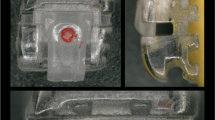Abstract.
Aim:
The purpose of this study was to compare the torque deformation characteristics of seven commercially available plastic brackets, both amongst each other and with stainless steel brackets.
Material and Methods:
Ten brackets each of (1) pure polycarbonate, (2) ceramic reinforced polycarbonate, (3) fiberglass reinforced polycarbonate, (4) ceramic reinforced polycarbonate with metal slot, (5) fiberglass reinforced polycarbonate with metal slot, (6) polyurethane, and (7) polyurethane with metal slot were exposed to torsion in a torquemeter, following an aging process according to ISO 10477. Ten stainless steel brackets served as a control group. Torsion was applied continuously using a material testing machine (Zwick Z2.5, Zwick Materialprüfung, Ulm, Germany).
Results:
The results showed within the group of plastic brackets that metal slot reinforced brackets were subject to the lowest degree of deformation, followed by the brackets made of pure polyurethane, pure polycarbonate and fiberglass reinforced polycarbonate. The ceramic reinforced polycarbonate brackets showed the highest deformation under torque stress. The plastic deformation of the ceramic reinforced, fiberglass reinforced and pure polycarbonate brackets started even in the recommended torque range of 10–20 Nmm. The additional ceramic and fiberglass in the plastic brackets investigated in this study did not improve the torque stability of the polycarbonate brackets. The pure polyurethane brackets showed no significant difference from the pure polycarbonate brackets at the moment of 15 Nmm which is the optimal torque for a maxillary incisor.
Conclusion:
A comparison with the stainless steel brackets illustrated that plastic brackets are suited for clinical application only if they have a metal slot.
Zusammenfassung.
Ziel:
Ziel dieser Untersuchung war, die Verformung von sieben aktuell auf dem Markt befindlichen Kunststoffbrackets bei Torquebelastung untereinander und mit Stahlbrackets zu vergleichen.
Material und Methoden:
Jeweils zehn Brackets aus reinem Polycarbonat, keramikverstärktem und glasfaserverstärktem Polycarbonat, keramikverstärktem und glasfaserverstärktem Polycarbonat mit Metallslot, Polyurethan und Polyurethan mit Metallslot wurden nach Alterung gemäß ISO 10477 in einer Torqueapparatur belastet. Zehn Stahlbrackets dienten als Kontrollgruppe. Die Applikation der Torquemomente erfolgte kontinuierlich mit einer Prüfmaschine (Zwick Z2,5, Zwick Materialprüfung, Ulm).
Ergebnisse:
Die Ergebnisse zeigen innerhalb der Kunststoffgruppe für die Brackets mit Metallslot das geringste Ausmaß an Deformation gefolgt von der Gruppe der Brackets aus reinem Polyurethan, reinem und glasfaserverstärktem Polycarbonat. Die keramikverstärkten Polycarbonatbrackets erfuhren die stärksten Verformungen unter Torquebelastung. Die plastische Verformung der keramikverstärkten, glasfaserverstärkten und reinen Polycarbonatbrackets setzte bereits im empfohlenen Torquebelastungsbereich von 10–20 Nmm ein. Der Zusatz von Keramik und Glasfaser bei den in dieser Studie untersuchten Kunststoffbrackets führte nicht zu einer Verbesserung der Torquestabilität von Polycarbonatbrackets. Die reinen Polyurethanbrackets zeigten bei dem optimalen Torquewert von 15 Nmm keinen signifikanten Unterschied zu den reinen Polycarbonatbrackets.
Schlussfolgerung:
Der Vergleich mit den Stahlbrackets verdeutlichte, dass für die klinische Anwendung nur Kunststoffbrackets mit Metallslot geeignet sind.
Similar content being viewed by others
Author information
Authors and Affiliations
Corresponding author
Rights and permissions
About this article
Cite this article
Sadat-Khonsari, R., Moshtaghy, A., Schlegel, V. et al. Torque Deformation Characteristics of Plastic Brackets: A Comparative Study. J Orofac Orthop 65, 26–33 (2004). https://doi.org/10.1007/s00056-004-0205-6
Received:
Accepted:
Issue Date:
DOI: https://doi.org/10.1007/s00056-004-0205-6




